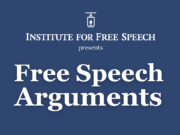Episode 18: Little v. Llano County
Little, et al. v. Llano County, et al., argued en banc before the U.S. Court of Appeals for the Fifth Circuit on September 24, 2024. Argued by Jonathan F. Mitchell (on behalf of Llano County, et al.), Henry Charles Whitaker (on behalf of Amici Curiae States supporting Llano County), and Matthew Borden (on behalf of Little, et al.).
*Note: a full transcript of the argument may be found under “resources” at the bottom of the page
Statement of Issues Presented for Review, from the Brief of Plaintiffs-Appellees:
1. Did the District Court clearly err in finding that Defendants removed 17 books from the public library because of their viewpoint and content, when the books did not meet the library’s own criteria for “weeding” books, Defendants’ internal communications referred to the books as “pornographic filth,” and Defendants offered demonstrably false testimony and pretextual explanations to justify their removal?
2. Did the District Court act within its discretion when it issued a preliminary injunction restoring the status quo by preventing Defendants from hiding the 17 books from library patrons until the merits of the case are decided?
3. Can Defendants moot the need for an injunction by having their lawyer buy the 17 books in question and place them in a non-public room in the library, where their presence is not listed in the library catalogue, is not advertised to patrons, and is not communicated by the library through the channels normally employed to tell library patrons that books are available?
From the dissent by Judge Stuart Kyle Duncan in the vacated panel opinion (citations omitted):
The commission hanging in my office says “Judge,” not “Librarian.” Imagine my surprise, then, to learn that my two esteemed colleagues have appointed themselves co-chairs of every public library board across the Fifth Circuit. In that new role, they have issued “rules” for when librarians can remove books from the shelves and when they cannot. While I do not doubt my colleagues’ good intentions, these “rules” are a disaster. They lack any basis in law or common sense. And applying them will be a nightmare.
Look no further than today’s decision. The two judges in the majority, while agreeing on the rules, cannot agree on how they apply to over half of the 17 books in this case. So, according to Judge Wiener, a library cannot remove It’s Perfectly Normal, a sex-education book for 10-year-olds that has cartoons of people having sex and masturbating. But according to Judge Southwick, removing that book is “likely permissible,” at least “[a]t this stage of the case,” because it contains “sexually explicit material that [i]s not appropriate for children.” Evidently, both judges would not allow a librarian to remove racist books—unless they have a “poor circulation history.” They differ, however, on how the rules apply to a series of children’s books about flatulence. And so we have a genuine first in the Federal Reporter: federal judges debating whether the First Amendment lets a library remove a book called (I kid you not) Larry the Farting Leprechaun.
This journey into jurisprudential inanity should never have been launched. There is a simple answer to the question posed by this case: A public library’s choice of some books for its collection, and its rejection of others, is government speech. I dissent.
Resources:
- CourtListener case docket for Little v. Llano County
- En Banc Supplemental Brief of Plaintiffs-Appellees
- Corrected Supplemental Brief of Defendants-Appellants
- “Discard [Library] Books … That Reflect Gender, Family, Ethnic, or Racial Bias” – analysis by Eugene Volokh (Reason / the Volokh Conspiracy)
- Oral Argument Transcript
(Note: The transcript was automatically generated from Apple Podcasts. We have added speaker names, but the transcript has not been verified by a human. Please excuse any typos or inaccuracies resulting from the automatically generated transcription.)
Listen to the argument here:
The Institute for Free Speech promotes and defends the political speech rights to freely speak, assemble, publish, and petition the government guaranteed by the First Amendment. If you’re enjoying the Free Speech Arguments podcast, please subscribe and leave a review on your preferred podcast platform.













